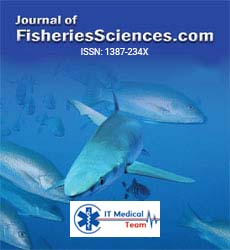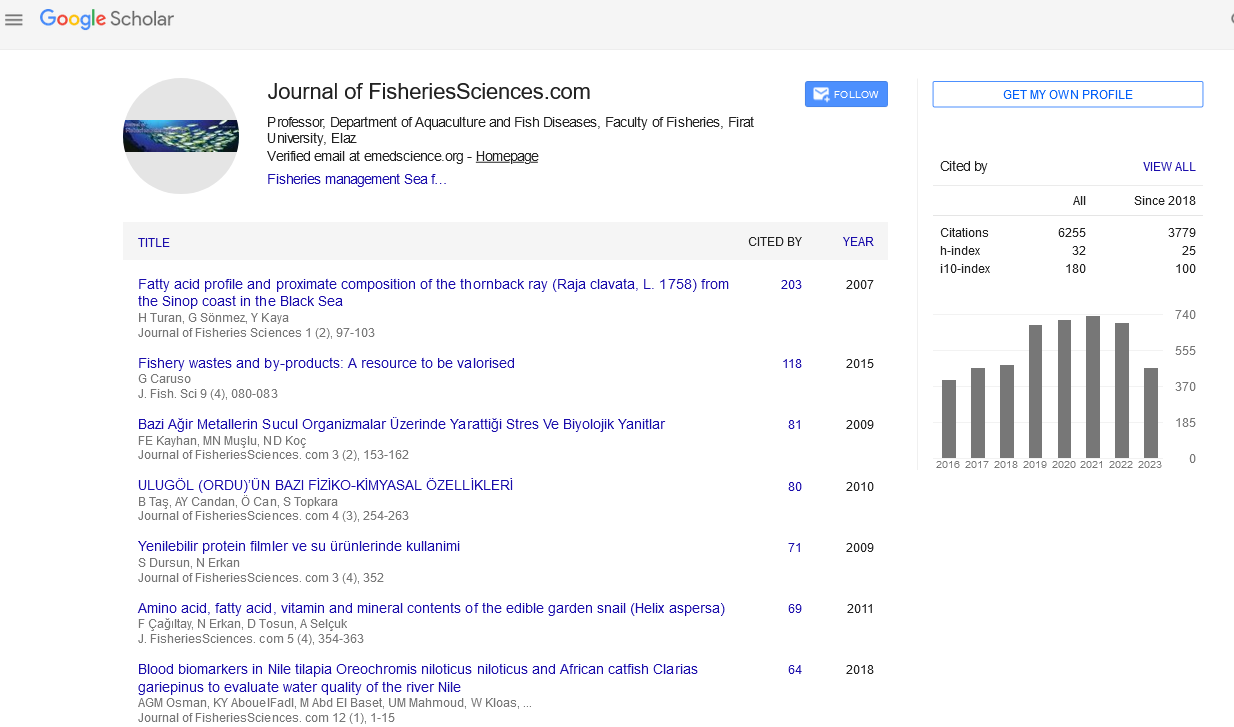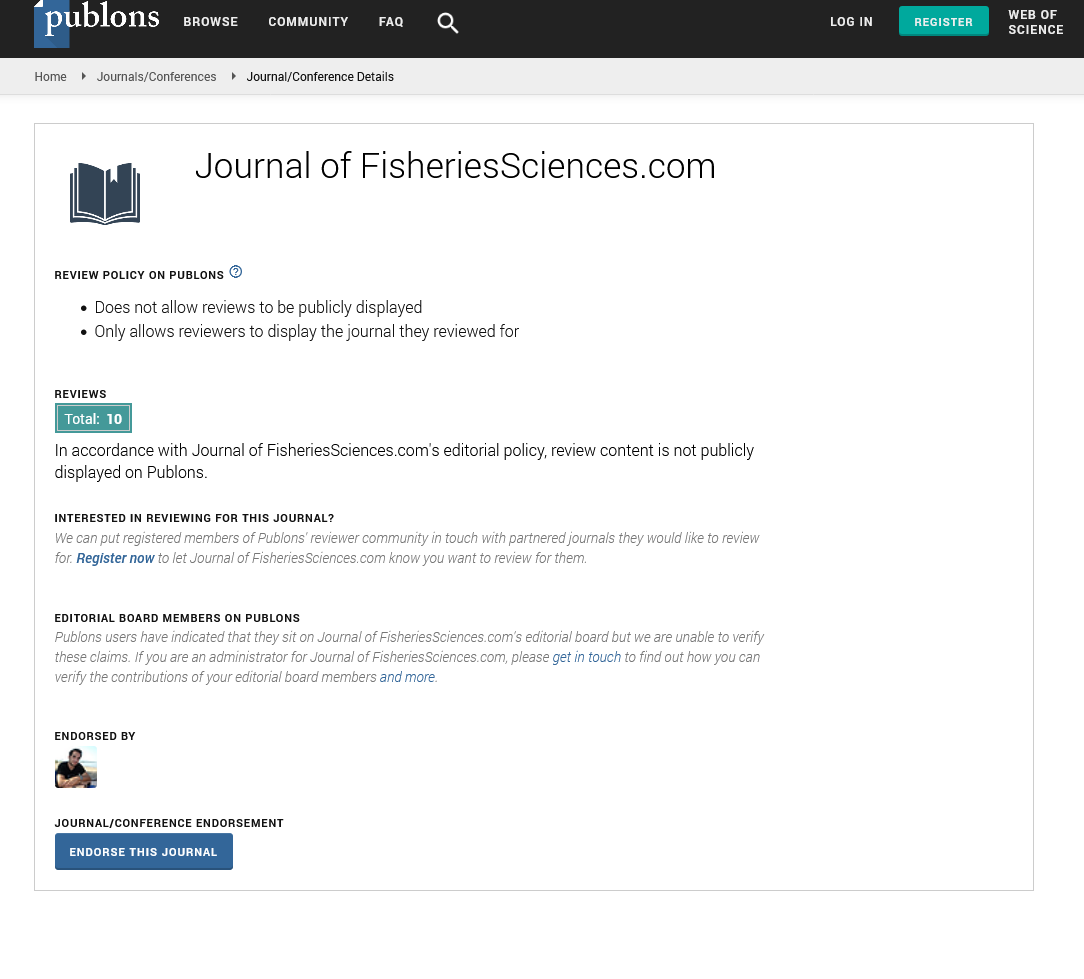Perspective Article - (2023) Volume 17, Issue 5
Navigating troubled waters: The future of fish stocks and sustainable fisheries management
Murugeswaran Dayana Senthamarai*
Department of Aquaculture, Dr. Rajendra Prasad Central Agricultural University, Bihar, India
*Correspondence:
Murugeswaran Dayana Senthamarai, Department of Aquaculture, Dr. Rajendra Prasad Central Agricultural University, Bihar,
India,
Email:
Received: 15-Sep-2023, Manuscript No. IPFS-23-14262;
Editor assigned: 20-Sep-2023, Pre QC No. IPFS-23-14262 (PQ);
Reviewed: 04-Oct-2023, QC No. IPFS-23-14262;
Revised: 19-Oct-2023, Manuscript No. IPFS-23-14262 (R);
Published:
27-Oct-2023
Introduction
The world's oceans have long been a source of sustenance,
commerce, and wonder. They cover more than 70% of our
planet's surface, teeming with life and offering a wealth of
resources. Among these resources, fish stocks have played
a vital role in human history, providing sustenance for
coastal communities, driving economies, and shaping
cultures. However, the sustainability of these fish stocks is
increasingly at risk due to overfishing, habitat degradation,
and climate change. In this article, we will explore the
current state of fish stocks, the challenges they face, and
the innovative solutions that are emerging to ensure their
future survival.
Description
The importance of fish stocks
Historical significance: Throughout history, fish stocks have been an integral part of human existence. From the indigenous peoples who relied on salmon runs for their survival to ancient Mediterranean societies that prized the bounty of the sea, fish have played a crucial role in the development of civilizations. Their importance is not limited to coastal communities; fish stocks have been a source of trade, wealth, and global cultural exchange.
Economic impact: Today, fish stocks remain a significant source of income for millions of people worldwide. The global fishing industry generates billions of dollars annually, providing jobs for fishermen, processors, distributors, and restaurants. Furthermore, seafood exports are a valuable source of foreign exchange for many countries, supporting their economies.
Nutritional value: Fish is also a crucial source of nutrition for billions of people. It is a low-fat, high-protein food that contains essential nutrients, including Omega-3 fatty acids, which have been linked to numerous health benefits. Fish is a primary protein source for many communities, particularly in regions where alternative protein sources are scarce.
The current state of fish stocks
Overfishing: One of the most significant threats to fish stocks is overfishing. Over the years, the demand for seafood has skyrocketed, leading to the depletion of many popular fish species. Modern fishing techniques, such as longlining and trawling have made it easier to catch large quantities of fish in a short period, putting immense pressure on fish populations. In some cases, overfishing has led to the collapse of entire fisheries.
Bycatch: Bycatch, the unintended capture of non-target species, is another major issue affecting fish stocks. It often results in the unnecessary death of various marine creatures, including endangered species, and further strains the ecosystems in which they live.
Habitat destruction: The destruction of critical marine habitats, such as coral reefs and seagrass beds, has a profound impact on fish stocks. These habitats serve as breeding and feeding grounds for many fish species. Pollution, climate change, and coastal development have all contributed to the decline of these essential ecosystems.
Climate change: Climate change is an overarching challenge for fish stocks. Rising sea temperatures, ocean acidification, and shifting ocean currents can affect the distribution and abundance of fish species. Many traditional fishing grounds are no longer as productive, leading to significant changes in fishing patterns and the need for adaptation.
Innovative solutions for sustainable fisheries management
Sustainable fishing practices: The transition to sustainable fishing practices is essential for the future of fish stocks. This includes implementing fishing quotas and regulations that prevent overfishing, protect endangered species, and minimize bycatch. Sustainable fishing practices also encourage the use of more selective and environmentally friendly gear.
Aquaculture: Aquaculture, the farming of fish and other aquatic species, has gained prominence as an alternative to traditional fishing. When properly managed, aquaculture can reduce pressure on wild fish stocks and provide a reliable source of seafood. Innovations in aquaculture techniques are making it more sustainable and environmentally friendly.
Marine protected areas: The establishment of Marine Protected Areas (MPAs) is a crucial step toward conserving fish stocks. MPAs are designated areas where fishing activities are restricted or prohibited to allow fish populations to recover and ecosystems to thrive. These areas help maintain biodiversity and provide a sanctuary for species facing overexploitation.
Sustainable seafood certification: Consumers can play a vital role in supporting sustainable fisheries by choosing seafood products certified by organizations like the Marine Stewardship Council (MSC) or the Aquaculture Stewardship Council (ASC). These certifications ensure that seafood comes from well-managed, sustainable sources, providing an incentive for responsible fishing practices.
Global cooperation for sustainable fisheries
International agreements: Fish stocks do not respect national borders, so international cooperation is essential for their conservation. International agreements, such as the United Nations Convention on the Law of the Sea (UNCLOS) and Regional Fisheries Management Organizations (RFMOs), play a crucial role in regulating and managing fish stocks on a global scale.
Combatting Illegal, Unreported, and Unregulated (IUU) fishing: Illegal fishing poses a severe threat to fish stocks. IUU fishing depletes fish populations, threatens ecosystems, and undermines the efforts of legitimate fishermen. Combating IUU fishing requires better enforcement, technology, and international cooperation to track and prevent illicit activities.
The role of technology in fisheries management
Satellite tracking: Satellite technology has revolutionized fisheries management by enabling real-time tracking of fishing vessels. This technology helps authorities monitor fishing activities and enforce regulations, making it more challenging for illegal fishing to go unchecked.
Data analytics: Advanced data analytics and machine learning are being used to analyze large datasets from various sources, such as satellite imagery and fishing vessel tracking, to improve fisheries management. These tools help authorities make data-driven decisions and identify trends in fishing activities.
Blockchain technology: Blockchain technology is being explored as a way to create transparent supply chains for seafood products. This would allow consumers to trace the origin of their seafood and verify its sustainability, promoting responsible consumer choices.
The role of consumers
Consumers have the power to drive change in the fishing industry by making informed choices. By supporting sustainable seafood and demanding transparency in the supply chain, individuals can encourage responsible fishing practices and contribute to the conservation of fish stocks.
Conclusion
The future of fish stocks is at a critical juncture. While
overfishing, habitat destruction, and climate change
continue to threaten these vital resources, innovative
solutions and international cooperation offer hope for their
conservation. Sustainable fishing practices, aquaculture,
marine protected areas, and advancements in technology
are all contributing to the effort to protect fish stocks and
maintain healthy oceans. The role of consumers in making
responsible choices and demanding sustainable seafood
is equally important. Together, we can navigate these
troubled waters and secure a future where fish stocks thrive
for generations to come.






